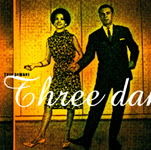|
|
 |
Dusted Reviews
Artist: Trio Sowari Album: Three Dances Label: Potlatch Review date: Sep. 6, 2005 |

|
|
|
 |
Phil Durrant is one of the most important improvisers in Europe, yet one rarely encounters his name with anywhere near the frequency (or admiration). Part of a generation of players who, like saxophonist John Butcher, are highly influenced by the first wave of British free improvisation (not just Parker and Bailey, but John Stevens’ Spontaneous Music Ensemble), Durrant has also served as a key link between this style of improvisation and the newer styles of post-AMM improvisation. His projects are too numerous to list, but it is significant that this fine trio – Durrant (who leaves his violin in its case in favor of software sampler, synthesizer, and electronic treatments), tenor saxophonist Bertrand Denzler and percussionist Burkhard Beins – has chosen to name itself after Durrant’s 1996 solo recording on Acta. That disc represented one of Durrant’s earliest reconsiderations of his instrument and improvisational style, a register of his ongoing musical courage. And while this trio music isn’t exactly a wholesale reconceptualization, it is nonetheless a powerful document that focuses its energies in a provocative way.
One of the misunderstandings most frequently encountered in and around electro-acoustic improvisation is that “nothing happens.” There is no burning solo, no ass-rocking pulse, neither chamber repose nor extroverted wildness to shake you by the lapels. And yet, as the title of this disc interestingly suggests, one need not “dance” in any conventional sense in order to move freely. The titles of these three improvisations – “Rondo,” “Bolero” and “Tumble” – constitute both an ironic gesture and an abstraction of the meaning of dance, where one thinks simply of bodies in motion rather than formal convention. And so it is that Trio Sowari focuses throughout on extensions of time and the layering of sound. It’s easy enough to pay attention simply to their techniques, that’s for sure. But the more you hear Beins’ grainy circular patterns, Durrant’s plangent backdrops, and Denzler’s wet, throaty burrowing, the more an almost contrapuntal quality emerges (though there is no stated pulse anywhere in this music).
Their explorations also extend to reconsiderations of the customary dynamics of this kind of improvisation (“Rondo” raucous steam vents explode at peak levels, cooling down from there), and to the uses of disruption (the digital hiccups during the otherwise ethereal “Bolero”). But it’s really on the 25-minute “Tumble” where the music comes together, as low excavation sounds dance with the high sine waves. Overall, this is a really fine disc, one whose considered methodology doesn’t undermine its moments of beauty.
By Jason Bivins
|







